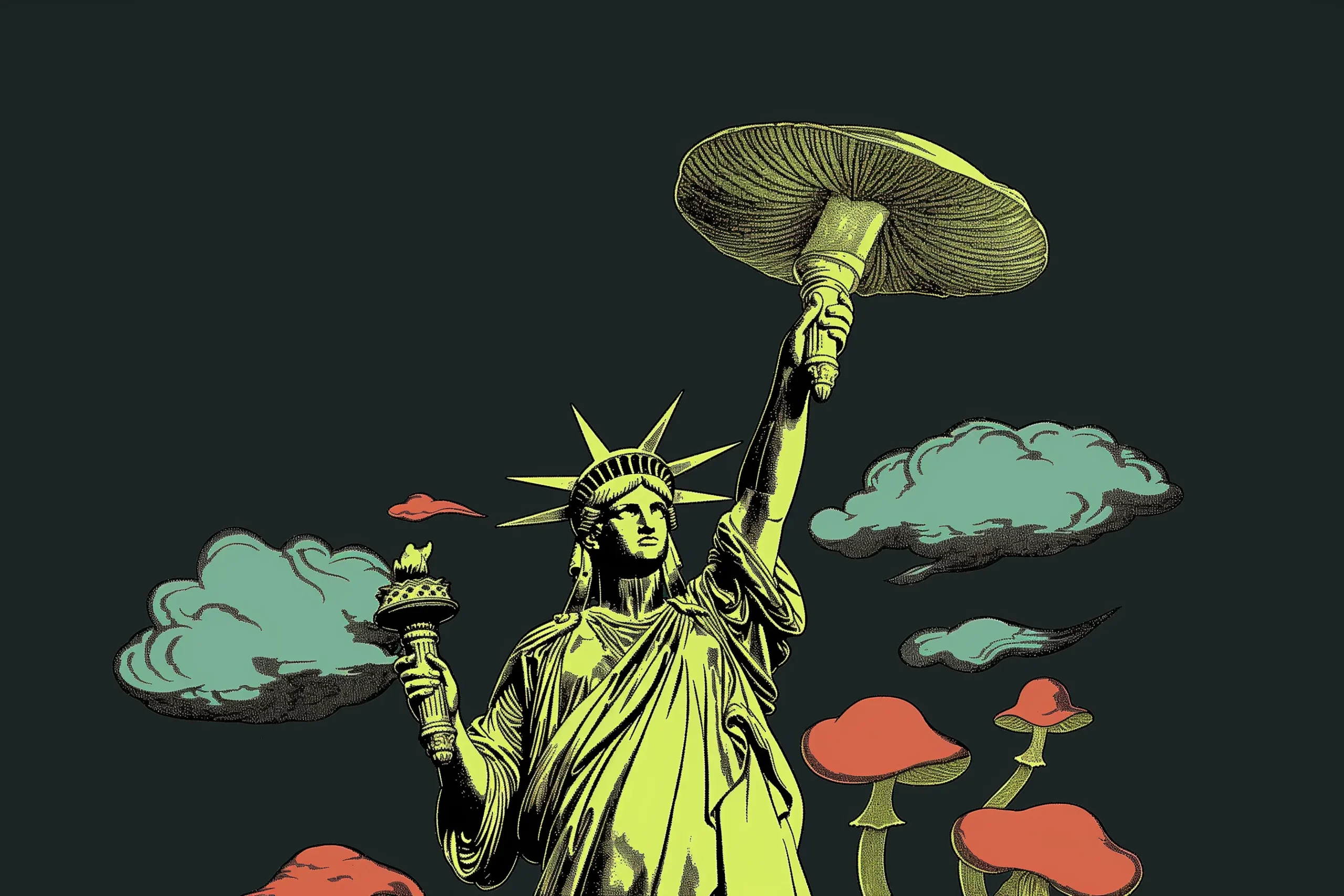This week’s Psychedelic News Roundup highlights LSD receiving FDA Breakthrough Therapy Designation and Canadian magic mushroom store’s legal and regulatory struggles. Other news includes details on the rapidly emerging Chinese psychedelic sector and how a Jamaican psilocybin grower is using technology to change how we grow shrooms.
MindMed Receives FDA Breakthrough Therapy Designation For LSD
Major industry news as MindMed’s LSD treatment for generalized anxiety disorder (GAD) receives the FDA’s Breakthrough Therapy Designation. The FDA has granted Breakthrough Therapy Designation to MindMed’s LSD (lysergide d-tartrate) program, MM120, a pivotal moment in the treatment of generalized anxiety disorder and psychedelic medicine’s move towards mainstream medical use.
Breakthrough Therapy Designation will help expedite the FDA approval process and provide guidance from FDA senior managers. To date, only two other programs have received FDA Breakthrough Therapy status for psychedelics: Compass Pathways and its psilocybin program for treatment-resistant depression and MDMA-assisted therapy for PTSD.
Moving forward, MindMed plans to hold an End-of-Phase 2 meeting with the FDA in the first half of 2024 and initiate a Phase III clinical program in the second half of 2024.
Keep Up with Uncensored Psychedelic Trends
Join our newsletter at Psychedelics Uncensored.
We respect and protect your privacy. By subscribing your info will be subject to our privacy policy . Unsubscribe easily at any time
Read our full coverage here.
Vancouver Reinstates License for Magic Mushroom Dispensary Amid Legal and Political Debate

Coming to us via Vancouver City News, in a controversial decision, a sub-committee of the Vancouver City Council has reinstated the business license for The Medicinal Mushroom Dispensary, a vendor of magic mushrooms, despite potential legal repercussions highlighted by B.C.’s Public Safety Minister. This decision, made by two Green Party councilors and one ABC councilor, has ignited a debate within the city’s political landscape, particularly drawing criticism from Mayor Ken Sim. The mayor expressed his disappointment, labeling the decision as activism and inappropriate for a city business license hearing, suggesting such discussions belong at the federal level.
The dispensary, which had its license revoked following a police raid in November for selling illegal psychedelic drugs, successfully argued for reinstatement due to the lack of a clear history of violations. Councillor Pete Fry, one of the motion’s supporters, pointed to the absence of “gross misconduct” and indicated the city’s chief license inspector’s recommendations influenced their decision. Fry also highlighted the broader implications of the decision, advocating for a regulatory framework to support the medicinal use of psychedelics and suggesting that the current situation offers an opportunity to discuss harm reduction and safe supply strategies under Mayor Sim’s leadership.
The reinstatement has sparked a dialogue on the future of psychedelic substances in Vancouver, with parallels drawn to the city’s approach to medicinal cannabis dispensaries before legalization. Dana Larsen, director of the dispensary, views the subcommittee’s decision as a positive step towards the legalization of psychedelics, emphasizing the need for regulation over sporadic police raids. However, the Public Safety Minister, Mike Farnworth, expressed confusion over the decision, given the illegal status of psilocybin in Canada. As the debate continues, the Vancouver Police Department has reiterated that trafficking controlled substances remains illegal, with ongoing investigations into the dispensary’s activities.
China’s Psychedelic Scene Mirrors Silicon Valley’s Utilitarian Approach
As detailed by Vox, China’s burgeoning psychedelic scene is drawing attention for its unique cultural influences on psychedelic experiences, challenging the notion that the impact of psychedelics is universal. Anthropologists, delving into how culture shapes these experiences, have observed that China’s psychedelic users are incorporating these substances into their lives in ways that reflect the country’s modern, secular, and highly surveilled society. For instance, the experience of a young Chinese writer, Zhang, during a DMT trip, highlighted visions deeply intertwined with China’s digital and surveillance culture, suggesting that one’s cultural backdrop significantly molds the psychedelic experience.
The comparison of China’s psychedelic scene to Silicon Valley’s pragmatic use of psychedelics for productivity and innovation reveals a global trend of secular and utilitarian approaches to these substances. This perspective challenges the traditional view that associates psychedelic use primarily with spiritual and religious practices. In China, as in Silicon Valley, individuals are turning to psychedelics not just for spiritual enlightenment but for tangible benefits in their professional lives and personal development. This shift indicates a broader, cross-cultural embrace of psychedelics for diverse purposes beyond the confines of traditional spiritual settings.
Keep Up with Psychedelic Trends
Get uncensored psychedelic news, events, and updates. Join Psychedelics Uncensored!
We respect and protect your privacy. By subscribing your info will be subject to our privacy policy . Unsubscribe easily at any time
This emerging narrative within China’s psychedelic culture suggests a complex interplay between modernity, capitalism, and the search for meaning in a rapidly changing world. As psychedelics gain legal acceptance and enter therapeutic contexts in the West, it’s crucial to consider how cultural factors influence the psychedelic experience. The Chinese example prompts a reevaluation of the “disenchantment thesis” and invites a more nuanced understanding of how psychedelics can integrate into various aspects of life, from the spiritual to the mundane.
Rose Hill Advances Psilocybin Cultivation with Geo-Thermal Technology in Jamaica

Coming to us via Yahoo Finance, Rose Hill Health Holdings LLC, a leader in the Jamaican legal psilocybin industry, has significantly enhanced its cultivation capabilities by completing major facility renovations. These advancements have tripled the company’s production capacity from 40 kg to 100 kg of psilocybin per month, enabling Rose Hill to meet the growing global demand for premium psilocybin. The introduction of a geothermal system, alongside facility and operational upgrades, underscores Rose Hill’s commitment to sustainability and quality in psilocybin mushroom cultivation. This innovative approach utilizes renewable ground energy to maintain optimal cultivation conditions, reducing contamination risks and operational costs while minimizing environmental impact.
Navigating Jamaica’s challenging climate, Rose Hill has adapted its cultivation practices to thrive in extreme heat and humidity, akin to nurturing rare mushroom species in a wild forest. The company’s geothermal system, which circulates fluid through the ground, ensures the facility is less affected by external weather conditions, enhancing energy efficiency. Additional upgrades include a reconfigured building layout for streamlined production processes and a rebuilt on-site laboratory to reduce contamination risks. Since its inception in 2015, Rose Hill has emerged as a key supplier of psilocybin biomass to research institutions worldwide, achieving milestones such as Health Canada’s approval for the first legal export of psilocybin from Jamaica to Canada.
Looking forward, Rose Hill is poised for further collaborations and research partnerships, aiming to unlock psilocybin’s therapeutic potential and contribute to the sustainable growth of the psychedelics industry. With its state-of-the-art cultivation facility and commitment to excellence, Rose Hill is set to play a pivotal role in advancing psilocybin research and therapy.
Sources

1. Committee reinstates Vancouver mushroom dispensary licence. (n.d.). Vancouver.citynews.ca. Retrieved March 8, 2024, from https://vancouver.citynews.ca/2024/03/05/psychedelic-dispensary-business-license-vancouver/
2. Jarow, O. (2024, March 6). China’s emerging psychedelic scene looks a lot like Silicon Valley. Vox. https://www.vox.com/future-perfect/24091676/psychedelics-china-capitalism-silicon-valley-ayahuasca
3. Yahoo is part of the Yahoo family of brands. (n.d.). https://finance.yahoo.com/news/rose-hill-leads-way-psilocybin-140000414.html?guccounter=1&guce_referrer=aHR0cHM6Ly93d3cucmVkZGl0LmNvbS8&guce_referrer_sig=AQAAANWO3514jTrmetmwkno7_lVDI7Cd8kbbcbd7BlL6W6X72tgncQB1uJS04lMgOwbKhAD11FxSPGnJ62aqtai-v5-4MxinBePqsmORNJ1A_3e5-4fxDLbXao_qOtsON3-T9JG_HWgRvdhQfMeRz1WT8zBJu3-JV9AbMZZZfOeYlA59
This material is not intended as a replacement or substitute for any legal or medical advice. Always consult a medical professional about your health needs. Psychedelics are widely illegal in the United States, and readers should always be informed about local, state, and federal regulations regarding psychedelics or other drugs.

 David Connell
David Connell



 Ross Dillon
Ross Dillon 
